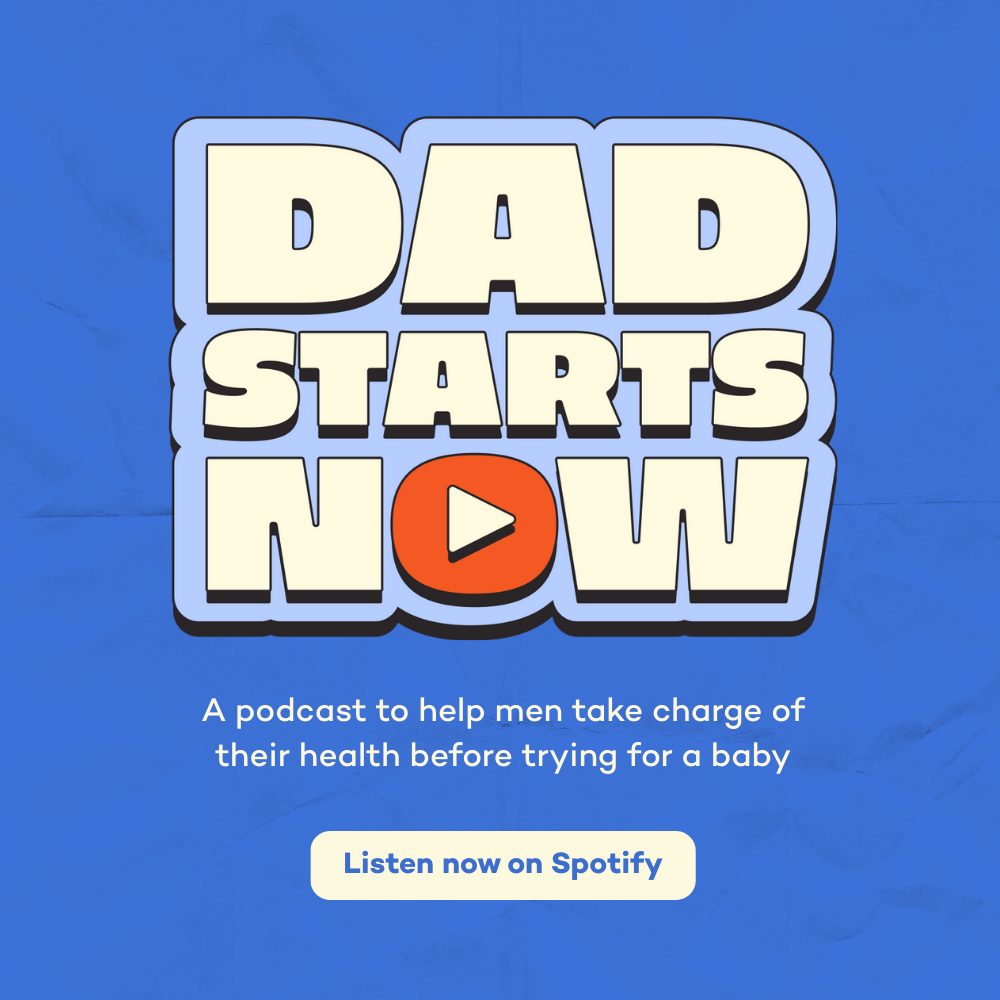Up to one in five confirmed pregnancies end in miscarriage — the loss of a baby before 20 weeks. Despite how common pregnancy loss is, there’s still taboo, stigma and silence around the topic and vast room for improvement in how society and the health system help parents navigate it. This is particularly the case for fathers who can feel overlooked, unacknowledged and their grief misunderstood1.
Ben and his partner Penny were upfront about wanting to start a family quickly when they first met but in the first two years of their relationship, they had an ectopic pregnancy followed by three miscarriages. Ben says the harrowing experiences were made worse by COVID-19 restrictions that often made it difficult to be with Penny in the hospital. Penny’s treatment was “really, really bad” and how Ben was coping was “never a point of discussion at all”.
“At the time, I was more concerned about Penny than anything, but then I’m the type of person where it takes me a while for things to sink in,”.
“ The most recent miscarriage, it’s probably hit me the most out of everything because we thought everything was going good and it didn’t, and I couldn’t be there for her.”
– Ben
Psychologist Narelle Dickinson says that although our recognition of miscarriage and care for grieving families has improved in the last few decades, work is still needed.
“Probably a generation ago it was still not acknowledged and certainly, there was no sense of respect and consideration for how profound a loss miscarriage can be for men or women,”.
“I do think that overall, we are probably getting better but we’ve still got a long way to go, and for men, I think we’ve got a really long way to go.”
– Narelle
What is miscarriage?
Miscarriage
A miscarriage is the spontaneous loss of a pregnancy and there’s usually no treatable cause found for a miscarriage. Most miscarriages occur because the fetus isn’t developing as expected and around half happen because of genetic abnormalities in the developing baby. You might feel guilt or self-blame over a miscarriage, but nothing can be done to prevent it if problems with the pregnancy are severe enough.
When a miscarriage is confirmed, you can choose to wait and see what will happen, which is called ‘expectant management’. If it’s an incomplete miscarriage (where some but not all pregnancy tissue has passed) the pregnancy tissue will often pass within days, but for a missed miscarriage (where the fetus or embryo has stopped growing but no tissue has passed) it might take up to three to four weeks. Your partner is likely to have heavy bleeding with cramping pain.
If the tissue does not pass naturally or there are signs of infection, the doctor will recommend a dilatation and curettage (D&C), which is a procedure to remove the pregnancy tissue. It takes five to ten minutes, but your partner will need to be in hospital for a few hours to recover.
Just because miscarriage is common doesn’t mean it’s not traumatic.
“The experience for men is it’s a different kind of trauma to what it is for the carrying person, even from a visual perspective,” Dickinson says. “You may not physically experience it, but you will be seeing it. You might be really frightened about what your partner is going through, particularly if there’s haemorrhaging — that can feel really, really terrifying. He might feel really quite helpless in the midst of all of that. That sense of traumatisation can be quite a different one from what the carrying person’s is.”
There’s no template for grief
You may not feel the physical changes of pregnancy or miscarriage, but the emotional loss can be just as significant.
“A lot of the models around grief, even our academic understanding of grief processes has changed,” Dickinson says. “Once upon a time, we kind of imagined that people had to follow through a series of discrete stages and they kind of had to complete a stage and then move on to another stage, and it was very predictable what grief would look like and how long it would take.”
It’s also a different experience for same sex couples hoping to become parents with the help of a surrogate.
“That’s a very complicated grief when a miscarriage occurs because they’ve lost their baby and they also have a sense of responsibility and care for their surrogate,” Dickinson says. “But at the same time, they are experiencing that emotional loss of their wanted baby and it’s no less than it is in a heterosexual relationship.”
The feelings around miscarriage for trans men are also complex.
“A trans man who is carrying a pregnancy is already going through a hugely complicated emotional experience of having to reset his body to do something that is generally, and certainly socially, considered as female,” Dickinson says. “If he’s then to lose that pregnancy through miscarriage, that is an incredibly complicated experience, physical and emotional experience for him.”
We now understand that everybody’s response to grief looks a little bit different and there’s no “right” way to feel or to display those feelings.
“Men don’t naturally always feel comfortable in expressing their emotions and in feeling vulnerable, and so where women might be more likely to express their grief through tears, through sadness, through talking about it, that can feel a lot more dangerous to men.”
You could be less likely to have emotional reactions outwardly and openly, or it could manifest in anger, irritability or withdrawal. Although our responses to grief are incredibly varied, men trend towards coping strategies such as keeping busy, seeking out distraction including increased exercise, returning to work, completing household tasks and creative hands-on outlets like woodworking or writing1. However, Dickinson warns men to be wary of overwhelming themselves with work or using compensatory behaviours as a way to drown out or avoid uncomfortable feelings.
“Try not to push things away by overusing alcohol or over-exercising or any of those sorts of binge-watching television or whatever else. They’re all avoidance strategies, which aren’t going to be very helpful, particularly not in the long run. A little bit of short-term avoidance doesn’t really hurt us, but when we just keep on using that, it starts to be destructive to us.”
It has taken Ben time to recognise how he’s feeling about the miscarriages.
“I’m pretty depressed to be honest, just no motivation. I don’t want to do anything, and my anxiety’s gone up a fair bit, but I’ve just started to come good,” he says. “Exercise is a massive thing for me because other than that, I get stuck inside my head, and I don’t leave the house.”
A lot of services don’t integrate the needs of fathers throughout the parenting journey and many men experience difficulty approaching or accessing support after miscarriage1. You might not automatically be offered the same sort of support as the miscarrying person, but don’t be afraid to ask for it.
“If you’re doing a follow-up session with an obstetrician after a miscarriage, the focus will be on the woman who miscarried, but if you’re not okay that’s a good time to say ‘I’m also not okay. Can I get some help too?’,” says Dickinson.
Supporting your partner
Being there for one another is important after a miscarriage. You might feel the impulse to put your grief aside and provide support for the person physically miscarrying. You might not want to burden your partner with how you’re feeling.
“What helps is just making sure Penny’s all right and just being there for her, doing what I can,” Ben says. “I’m naturally a bit of a caregiver but then I’m not very good at looking after myself that’s why it was taking so many weeks just to get on top of my own mental health.”
It’s important to acknowledge that it’s your loss as well.
“Try not to go into that stoic, ‘I’m here to be strong for my partner’ mode that a lot of men feel is their job when there’s a pregnancy loss,” Dickinson says. “For a lot of men, they think that’s what their partner needs, but it means that their own emotions are just being pushed down and often actually what their partner wants is to feel that shared emotional experience with him. So feeling like you can’t express the emotion can be actually quite counterproductive.”
Many men have found that different styles of grieving can cause conflict with their partner1 but chatting honestly about how you’re feeling, how you show it and what helps you manage it, can be beneficial.
You can also chat to friends, family or professional support like a counsellor. Most miscarriages happen in the first 12 weeks, so you might not have announced the news with others yet. It can still help to share what you’re going through and the kind of support you need with those around you.
How you can help other men
You might not know what to say when someone in your world has been through a loss but it’s important to acknowledge it — men who found a lack of acknowledgement or support from family and friends report worse grief experiences1.
“Invite them to talk, they may not take that up, but the invitation can be really important,”
– Dickinson
Although Ben knew his sister and friends from work had experienced pregnancy loss, it was never really openly spoken about.
“When Penny had her first ectopic [pregnancy] I would talk openly about it to the guys because it’s kind of like taboo and everyone steps on eggshells around that topic,” he says. “You can see some people were uneasy either hearing about it or discussing it further, but that was more the single men that don’t have a partner. The people who were married or had partners, they end up sharing their stories and what they’ve gone through or what their friends have experienced.”
Understand that dismissing or minimising the significance of a pregnancy and what it means to a person can be very hurtful.
“Grief is all about the person’s perception of loss and so the grief of an early-term miscarriage for one person might be equally profound to a much later pregnancy loss for another person,” Dickinson says. “It’s about how connected they’re feeling to that pregnancy, about how much they’ve been imagining it, and looking forward to meeting that baby, even if they only knew there was a pregnancy for a few days.”
Practical support like making meals is often appreciated but other gestures of care from male mates include sharing their own stories and scheduling time to catch up post-loss1.
System-wide change
Some significant strides to remove silence and stigma around miscarriage have been made in the workplace. In June 2021, legislation introduced by the federal government added miscarriage to the compassionate and bereavement leave entitlement, which means two days of paid leave will be provided to parents who suffer a miscarriage. Previously, FairWork Australia didn’t recognise a loss prior to 20 weeks and sick leave would need to be used. It’s a change that not only provides essential support for grieving parents but can encourage conversation around miscarriage.
Healthy Male’s Plus Paternal: Case for Change recognises that non-birthing parents, most commonly men, are not systematically engaged or supported when couples seek to, or have a child. And this can lead to worse outcomes for the whole family. Addressing male-specific needs requires tailored support and genuine engagement of men as equal partners throughout pregnancy, loss and grief. You can read more about Plus Paternal and our work here.
Read more: A man’s guide to going through IVF












